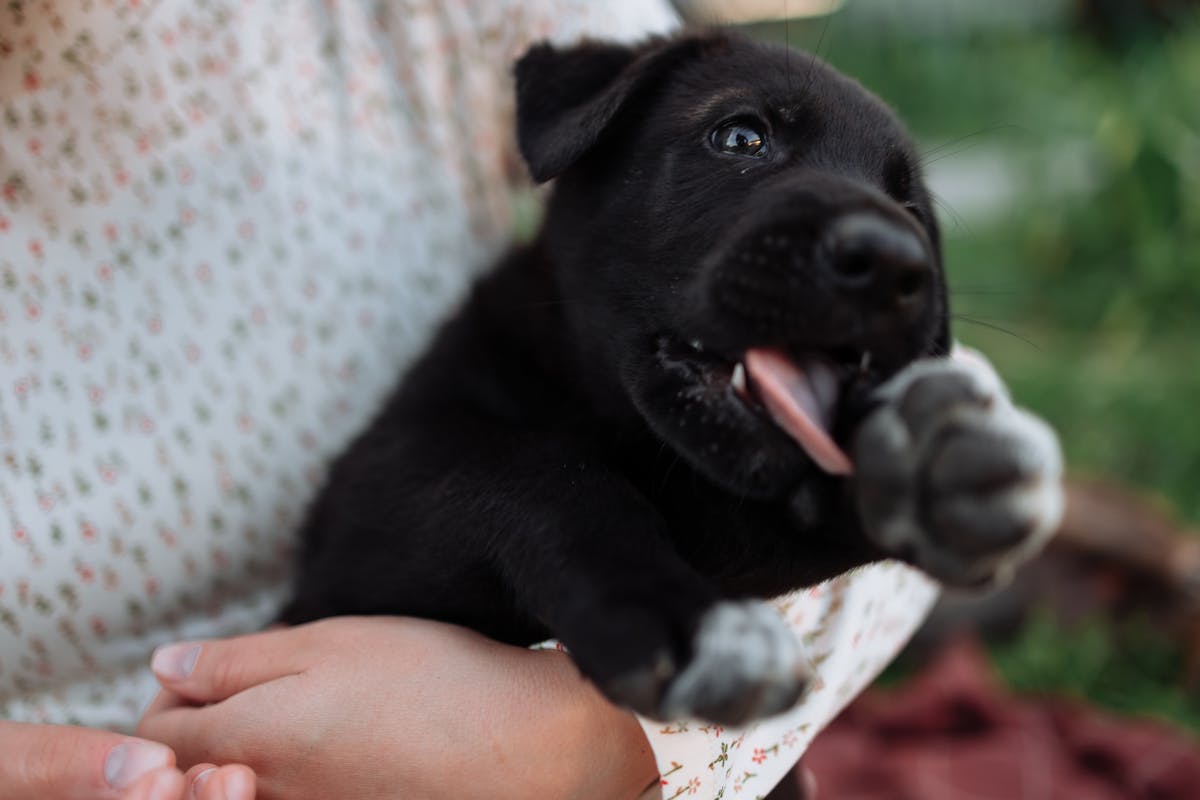Allergies, dry skin and infections are some of the common reasons why dogs bite themselves. Dogs biting themselves can be distressing for both pets and their owners.
While occasional scratching or licking is normal, repetitive biting often points to underlying health or behavioral issues.
This comprehensive guide explores the reasons behind self-biting in dogs, how to address it, and preventive measures to ensure your furry friend stays healthy and comfortable.
Table of Contents
ToggleIntroduction: Understanding Self-Biting in Dogs
Self-biting is more than a quirky habit—it’s often a sign of discomfort, irritation, or emotional stress.
While dogs naturally lick and groom themselves, frequent biting or chewing could lead to serious skin conditions if left untreated. Identifying the root cause early is essential for effective treatment and your dog’s overall well-being.
6 Common Reasons Dogs Bite Themselves
Here are the six most common causes of self-biting in dogs and how to address them:
1. Dry Skin
Dry skin in dogs often causes itchiness, leading to excessive biting or scratching. This condition can result from:
- Harsh weather conditions (e.g., cold, dry winters)
- Poor nutrition
- Frequent bathing with non-dog-specific shampoos
Symptoms:
- Flaky or scaly skin
- Redness or inflammation
- Hot spots and hair loss
Solution:
Consult a veterinarian to identify the underlying cause of dryness. Incorporate omega-3 fatty acids into your dog’s diet and use moisturizing, vet-approved shampoos to restore hydration.
2. Allergies
Dogs can suffer from environmental, food, or contact allergies. Common triggers include:
- Pollen, mold, or dust
- Certain proteins or grains in food
- Insect bites (especially fleas)
Symptoms:
- Itchy skin and rashes
- Watery eyes and a runny nose
- Chronic ear infections
Solution:
Work with your vet to pinpoint the allergen through elimination diets or allergy tests. Manage symptoms with antihistamines, medicated shampoos, or specialized diets.
3. Parasites
Fleas, ticks, and mites are notorious for causing itchy, irritated skin. Some dogs are particularly sensitive to flea saliva, leading to flea allergy dermatitis.
Symptoms:
- Persistent scratching or biting around the tail, legs, or neck
- Small red bumps or scabs
- Visible fleas or flea dirt
Solution:
Use veterinarian-recommended flea and tick prevention products, such as collars, topical treatments, or oral medications. Regular grooming and home cleaning can also help eliminate parasites.
4. Skin Infections
Bacterial, fungal, or yeast infections can irritate a dog’s skin, causing them to bite or chew the affected area. These infections are often secondary to other conditions like allergies or injuries.
Symptoms:
- Red, inflamed, or crusty skin
- Foul odor
- Pus-filled lesions
Solution:
Prompt veterinary treatment is essential. Depending on the infection type, your vet may prescribe antibiotics, antifungal medications, or medicated washes.
5. Arthritic Pain
Dogs with arthritis may lick or bite their joints in an attempt to soothe pain or irritation. This behavior is more common in older dogs but can also affect younger ones with joint issues.
Symptoms:
- Limping or stiffness
- Reluctance to move or climb stairs
- Irritability
Solution:
Consult your vet about pain management options, including anti-inflammatory medications, supplements like glucosamine, and physical therapy.
6. Anxiety and Boredom
Emotional distress can lead to compulsive behaviors such as excessive biting or licking. Dogs may bite themselves out of stress, loneliness, or boredom.
Symptoms:
- Restlessness and pacing
- Whining or barking excessively
- Destructive behaviors
Solution:
Provide mental stimulation through interactive toys, daily walks, and a consistent routine. In severe cases, consult a vet or dog behaviorist for additional guidance.
Recognizing the Symptoms
Self-biting may vary in intensity and location, depending on the underlying cause. Watch for these signs:
- Persistent biting or licking of a specific area
- Redness, swelling, or skin discoloration
- Hair loss or bald patches
- Foul-smelling skin or open sores
If you notice any of these symptoms, schedule a vet appointment immediately to prevent the issue from worsening.
How to Help Your Dog Stop Biting Itself
If your dog is biting themselves, here’s a step-by-step guide to help:
- Visit the Vet:
Rule out medical conditions such as infections, allergies, or parasites. - Follow Treatment Plans:
Apply prescribed ointments, shampoos, or medications as directed. Use distractions like chew toys to prevent licking after application. - Use an E-Collar:
A protective cone can stop your dog from worsening the irritation during recovery. - Address Behavioral Issues:
Spend quality time with your dog and establish a consistent daily routine. Mental and physical exercise is crucial for reducing anxiety-driven behaviors.
Preventing Self-Biting in Dogs
Prevention is always better than cure. Here’s how you can keep your dog healthy and itch-free:
- Groom Regularly:
Brush your dog’s coat to remove loose hair and debris. Use dog-friendly shampoos for bathing. - Use Parasite Preventatives:
Flea and tick collars or treatments are essential year-round. - Feed a Balanced Diet:
High-quality food with omega-3 fatty acids supports healthy skin. - Maintain Routine Vet Visits:
Regular check-ups help detect and address potential health issues early. - Provide Mental Stimulation:
Interactive toys, training sessions, and daily walks keep your dog entertained and reduce stress-related behaviors.
Conclusion
Dogs bite themselves for various reasons, from medical conditions like allergies and infections to emotional triggers like anxiety.
Understanding the root cause and taking appropriate action is vital to prevent complications and discomfort. By maintaining good grooming habits, providing a balanced diet, and addressing stress, you can ensure your dog leads a healthy, itch-free life.
FAQs
1. Why does my dog bite themselves excessively?
Excessive biting could indicate medical issues like allergies, parasites, or infections. Consult a vet to diagnose and treat the underlying cause.
2. Can stress cause dogs to bite themselves?
Yes, stress or boredom can lead to compulsive biting or licking. Providing regular exercise and mental stimulation can help reduce these behaviors.
3. Are there home remedies for itchy skin in dogs?
Oatmeal baths or coconut oil may provide temporary relief, but it’s important to consult a vet for proper diagnosis and treatment.
4. How can I prevent self-biting in my dog?
Regular grooming, parasite prevention, a balanced diet, and mental stimulation are key to preventing self-biting.
5. When should I take my dog to the vet?
Visit the vet if your dog’s biting is repetitive, causes skin damage, or is accompanied by symptoms like redness, swelling, or hair loss.
By understanding why dogs bite themselves and taking proactive steps, you can keep your furry friend healthy and comfortable.






